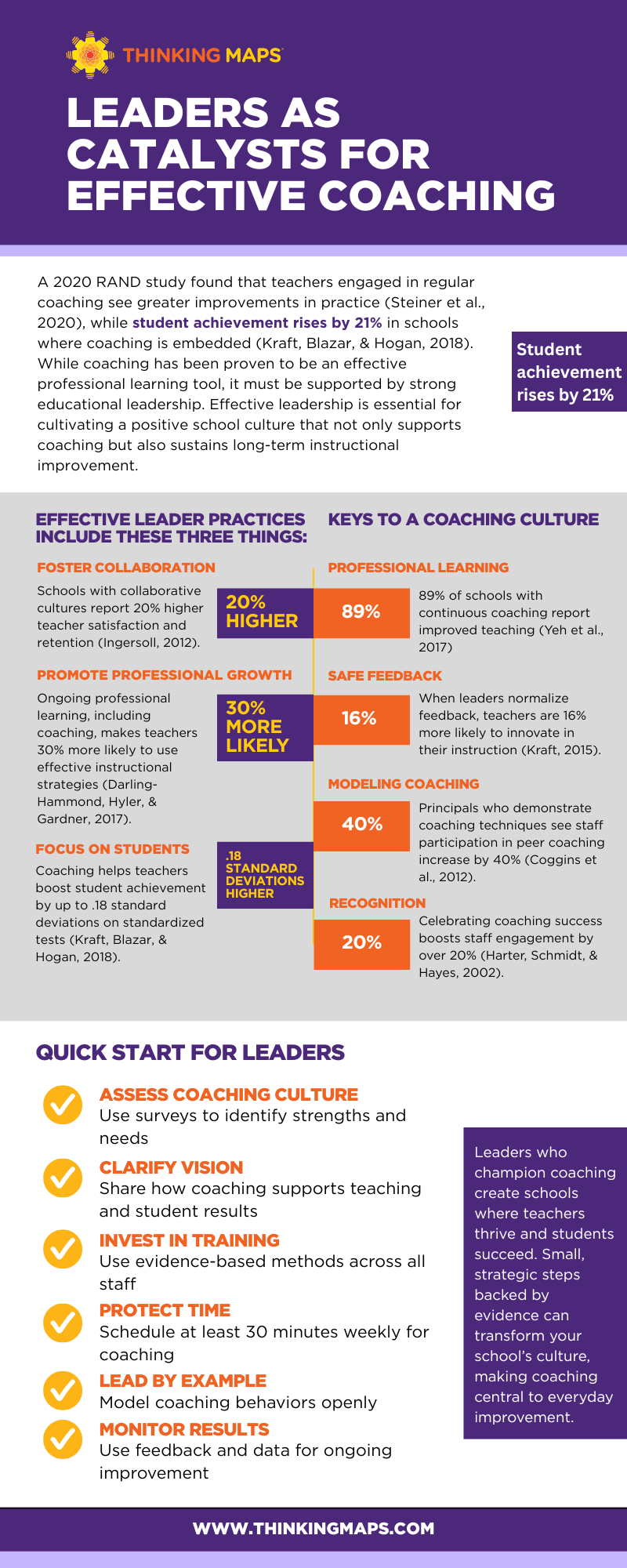Leaders as Catalysts for Effective Coaching
JULY 23, 2025
A 2020 RAND study found that teachers engaged in regular coaching see greater improvements in practice (Steiner et al., 2020), while student achievement rises by 21% in schools where coaching is embedded (Kraft, Blazar, & Hogan, 2018). While coaching has been proven to be an effective professional development tool, it must be supported by strong educational leadership. Effective leadership is essential for cultivating a positive school culture that not only supports coaching but also sustains long-term instructional improvement.
Why Leadership Matters
Effective leader practices include these three things:
- Foster Collaboration: Schools with collaborative cultures report 20% higher teacher satisfaction and retention (Ingersoll, 2012).
- Promote Professional Growth: Ongoing professional learning, including coaching, makes teachers 30% more likely to use effective instructional strategies (Darling-Hammond, Hyler, & Gardner, 2017).
- Focus on Students: Coaching helps teachers boost student achievement by up to .18 standard deviations on standardized tests (Kraft, Blazar, & Hogan, 2018).
Keys to a Coaching Culture
- Professional Learning: 89% of schools with continuing coaching report improved teaching (Yeh et al., 2017).
- Safe Feedback: When leaders normalize feedback, teachers are 16% more likely to innovate in their instruction (Kraft, 2015).
- Modeling Coaching: Principals who demonstrate coaching techniques see staff participation in peer coaching increase by 40% (Coggins et al., 2012).
- Recognition: Celebrating coaching success boosts staff engagement by over 20% (Harter, Schmidt, & Hayes, 2002).
- Peer Structures: Schools with peer coaching see a 12% jump in collaborative planning (Showers & Joyce, 1996).
Measurable Impact
- Teaching Quality: Coaching improves practice in 90% of studies reviewed (Kraft, Blazar, & Hogan, 2018).
- Collaboration: Schools see a 15% rise in staff collaboration (Goddard, Goddard, & Tschannen-Moran, 2007).
- Job Satisfaction: Coaching reduces teacher turnover by 25% (Kraft, 2015).
- Student Achievement: Instructional coaching leads to measurable academic gains (Kraft, Blazar, & Hogan, 2018).
Quick Start for Leaders
- Assess Coaching Culture: Use surveys to identify strengths and needs (Steiner et al., 2020).
- Clarify Vision: Share how coaching supports teaching and student results (Killion et al., 2012).
- Invest in Training: Use evidence-based methods across all staff (Darling-Hammond et al., 2017).
- Protect Time: Schedule at least 30 minutes weekly for coaching (Kraft & Blazar, 2017).
- Lead by Example: Model coaching behaviors openly (Coggins et al., 2012).
- Monitor Results: Use feedback and data for ongoing improvement (Steiner et al., 2020).
Apply It
Leaders who champion coaching create schools where teachers thrive and students succeed. Small, strategic steps backed by evidence can transform your school’s culture, making coaching central to everyday improvement.
Looking for more information on leadership or coaching? Check out our other blogs, Building a School-Wide Culture of Thinking: Leadership Strategies for Lasting Change and Embracing Coaching for Teacher Growth and Success.
Part of our online Thinking Maps Learning Community? Check out Trending Tips and Tricks Series, Coaching for Success.

Continue Reading
January 29, 2026
If you haven’t explored the TMLC AI Planner Tool, it’s certainly never too late and it’s actually now better than ever. Supercharged with more speed and accuracy so that you get the best of evolving technology, our AI Planner Tool is ready to empower your planning standards and best practices aligned plans that incorporate Thinking Maps.
November 24, 2025
Critical thinking is having a moment in education, but in many classrooms, it is still more slogan than reality. Drawing on their district- and classroom-level work with Thinking Maps, we were joined by four practitioners who shared what it really looks like to build a culture where students—not teachers—do the heavy cognitive lifting. Here are their 5 key takeaways.
September 17, 2025
Coaching is the cornerstone of professional growth in education, empowering teachers to refine their craft and drive student success. These 12 principles are designed to create lasting impact in classrooms and across school communities.
August 20, 2025
The back-to-school season always brings an opportunity for fresh ideas, renewed energy, and intentional planning. Take a walk through our newest AI-powered Planning Tools, designed to make classroom preparation more efficient and student learning more engaging.